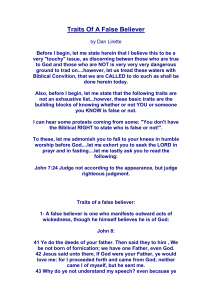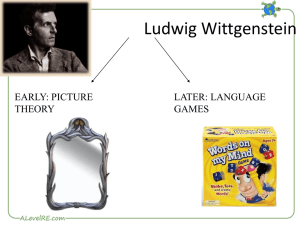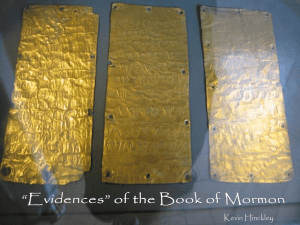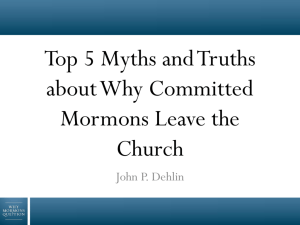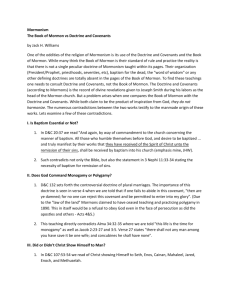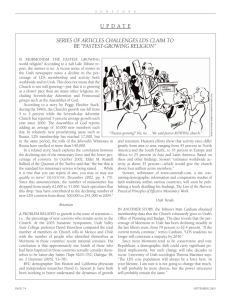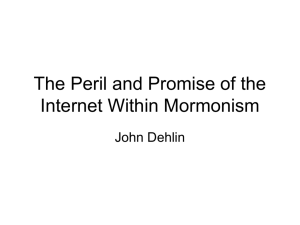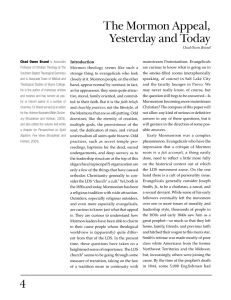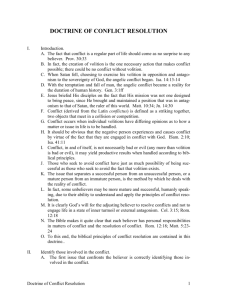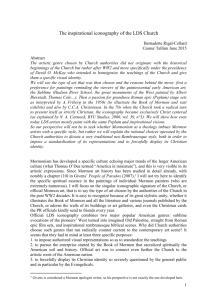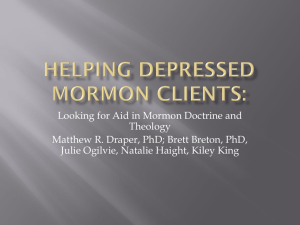can be found here - Mormon Stories Podcast
advertisement
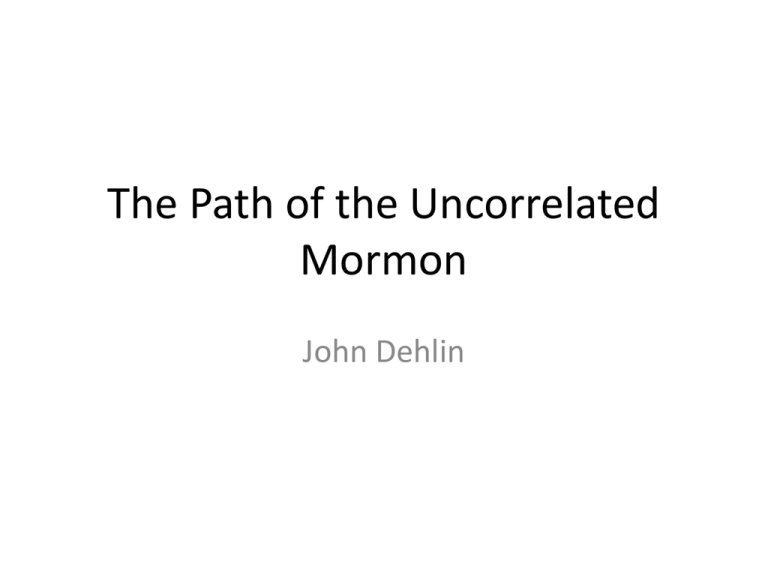
The Path of the Uncorrelated Mormon John Dehlin How do we create local and global communities of support for uncorrelated Mormons? The only question (for me) (Need help developing this presentation) (Not about word parsing, academic posturing) Some Common Stages True believer Traumatized believer Liberal believer Evaporation of traditional belief Pragmatic, non-believing participant Ex/Post-Mormon The True Believer “To believe in God is impossible. To not believe in Him is absurd.” Voltaire “If God did not exist it would be necessary to invent him.” Voltaire True Believer • God lives and He loves us • The scriptures are His word • Jesus died that we may live with God someday • Church leaders (GA’s and local) speak for God • LDS church members are chosen • The LDS church is true • Obey and be blessed Beautifully simple, Simply beautiful (Iron rod) 16,000,000 reasons to love Mormonism If I could have stayed in this stage, I would have The Traumatized Believer Love Studying Church History • Multiple, varying first vision accounts • Joseph’s use of folk magic/treasure digging • Book of Mormon translation (stone/hat) • Masonry / temple connection • Polygamy/polyandry and deception • Kinderhook plates • Book of Abraham • Church’s history with race • Dis-empowerment of women • Mountain Meadows Massacre • General lack of candor by church Thinking about doctrine/theology • Taking the Bible seriously • God-sanctioned genocide, sexism, homophobia? • The need for an atonement? • One true church w/ exclusive authority? • Apostasy? • Historical Book of Mormon? • Proxy work for the dead? • Church led by God? Spiritual Issues • • • • Never receiving a spiritual witness Feeling unfulfilled in church activity Feeling spiritually led elsewhere Redefining your understanding of spiritual knowledge • Disaffection of a loved-one Cultural Issues • Developing racial sympathies • Developing feminist sympathies • Developing LGBTQ (gay) feelings or sympathies • Developing liberal political sympathies • Extensive exposure to non-Mormons Organizational Issues • Corporate culture • Culture of authority, rules, and unquestioning obedience • Culture of patriarchy • The billion $ mall Non-Sources of Trauma (Disaffection Myths) • A desire to sin • Being offended • Caring too little No single smoking gun…. …instead a mosaic that lacks credibility Credible concerns by credible people For many, it’s the Church’s credibility that becomes the issue The Liberal Believer Liberal Believer • The gospel is still mostly true, but the church/leaders aren’t perfect • “Buffet” Mormon • A “shelf” for doubts/concerns • Lots of symbolic/metaphorical belief • “This is where God wants me….” • Patron saints: Lowell Bennion, Eugene England, Richard Bushman Challenges to Liberal Phase • The church is led in a somewhat authoritarian, literalistic way • By nature, liberals question, dissect, disobey • Open liberals are not generally appreciated in authoritarian organizations • Hard to be authentic, and hard to not feel like an outlier • Sometimes the trauma becomes too great Evaporation of Belief Evaporation of belief • God, Christ, all religious beliefs often go out the window • Hit rock bottom • Very, very disturbing and unsettling for many • “Dark night of the soul” Dark Night of the Soul • No existential foundation –Meaning, purpose, fear of death, loss of identity and values framework • Fear of losing family, friends, social network, jobs • Can’t tell anyone. Desperately lonely • Anxiety, depression, suicide At this point, some people circle back to a previous stage Factors that Affect Circling Back • What if my spouse leaves me? • How will I raise my children? • Concern about loss of respect from friends/family • Concern about social isolation • Desire to see a deceased loved one again • Concern about death • Concern about job security Pragmatic, Non-Believing Participant Pragmatic, Non-Believing Participant • Enjoy it. “Works for me.” • Can’t find anything better Problems with the Pragmatic Perspective • • • • • Usually involves staying silent Often leaves one feeling inauthentic Can lead to building internal pressure Can lead to bitterness/anger Can lead people to live a “double-life” The eventual killer: Integrity Ex/Post Mormon Ex/Post Mormon • Often is an incredible act of courage – Can lead to loss of family, friends, job, etc. • Can leave a huge vacuum in life • In early stages, can involve behaviors that are reactive to Mormonism – Coffee, alcohol, etc. • Involves establishing: – – – – New identity New moral framework New social community Coping mechanisms for death, suffering 1. There is a significant trend towards disbelief and disengagement (uncorrelation) in the LDS church (credibility and integrity are the 2 big issues) 2. This trend is much bigger than just the LDS church 3. There is probably little to nothing substantive that the church can do about it (and stay strong) 4. If you haven’t already become uncorrelated, you likely will, and the majority of your children or loved ones children most likely will 5) Becoming uncorrelated causes a major disruption and often leaves a significant vacuum in an active LDS church member’s life The Biggest Gaps When People Become Uncorrelated • • • • • • • Loss of spouse Loss of support for raising children and teens Loss of friends/family relationships Loss of moral framework Loss of identity Loss of spiritual framework/support Concern about job security Could We Create Together…. • Support for alternative approaches to a moral framework • Support for alternative forms of spirituality • A dating service for singles/divorced • Local communities – – – – For children -- Local play groups For teens -- EFY’s For college students -- College meet-up groups For couples/families – Book clubs, study groups • A new collective identity? (“Reform Judaism”) • • • • NOT a church/religion Can co-exist with church/religion Positive, constructive approach Carry forward the good in what got us here – Heavy emphasis on love/service – Support of families (all types) – Strong communities of support – Encouraging healthy living • Leave behind the less desirable things – Belief in harmful doctrine/theology – Bigotry – Sexism – Authoritarianism – Patriarchy – Elitism – Anti-intellectualism / anti-science • Strong appreciation of science • Rooted in common sense values/ethics How do we create local and global communities of support in support of transcendence? The only question (for me)
